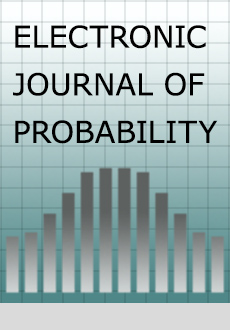Abstract
In this paper, we investigate the rate of convergence of the solution $u_\varepsilon$ of the random elliptic partial difference equation $(\nabla^{\varepsilon *} a(x/\varepsilon,\omega)\nabla^\varepsilon+1)u_\varepsilon(x,\omega)=f(x)$ to the corresponding homogenized solution. Here $x\in\varepsilon Z^d$, and $\omega\in\Omega$ represents the randomness. Assuming that $a(x)$'s are independent and uniformly elliptic, we shall obtain an upper bound $\varepsilon^\alpha$ for the rate of convergence, where $\alpha$ is a constant which depends on the dimension $d\ge 2$ and the deviation of $a(x,\omega)$ from the identity matrix. We will also show that the (statistical) average of $u_\varepsilon(x,\omega)$ and its derivatives decay exponentially for large $x$.
Citation
Joseph Conlon. Ali Naddaf. "On Homogenization Of Elliptic Equations With Random Coefficients." Electron. J. Probab. 5 1 - 58, 2000. https://doi.org/10.1214/EJP.v5-65
Information





